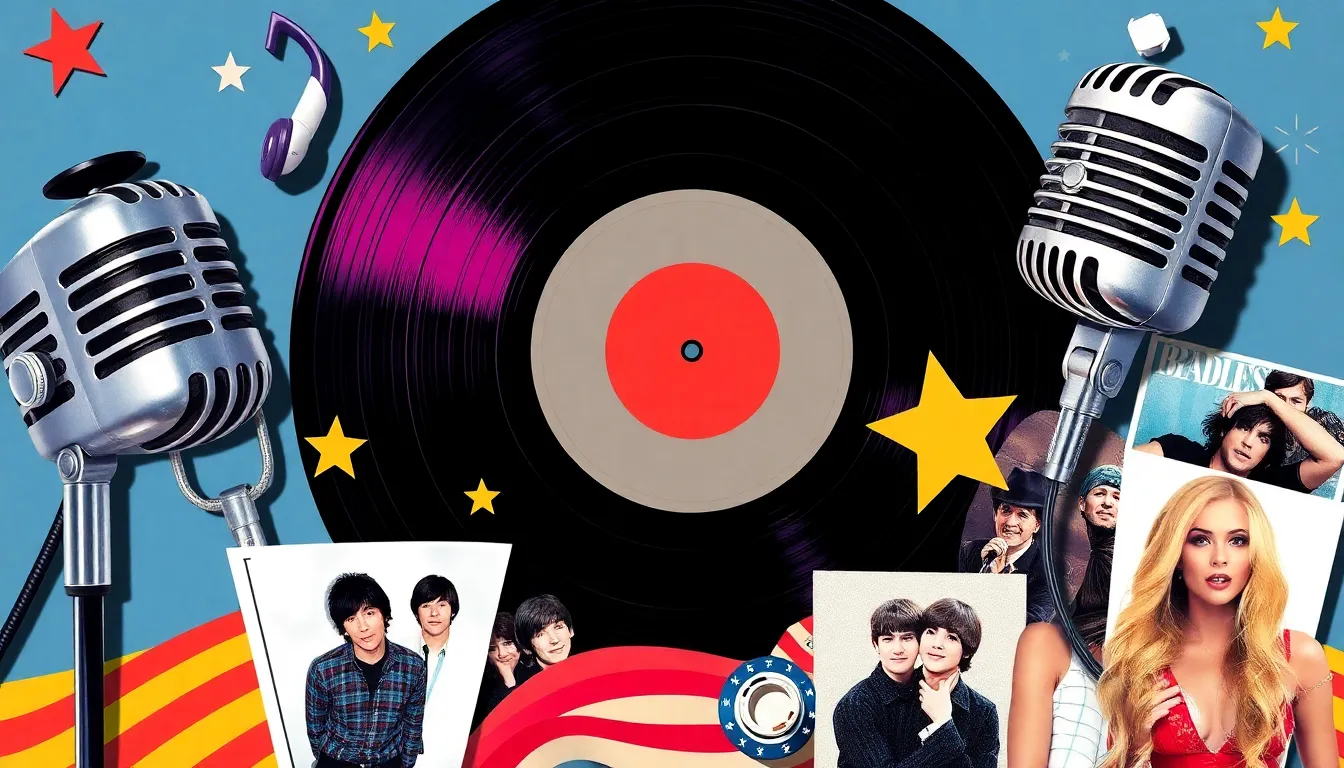Pop culture music is the soundtrack of our lives, weaving through the fabric of society and shaping trends like a DJ at a party. From catchy hooks to unforgettable beats, it’s the kind of music that gets stuck in your head and makes you want to dance like nobody’s watching—even if your cat is judging you from the couch.
In today’s fast-paced world, pop music isn’t just entertainment; it’s a cultural phenomenon that reflects our hopes, dreams, and sometimes our most embarrassing moments. Whether it’s the latest viral hit or a throwback anthem, pop culture music connects people across generations, turning strangers into dance partners at weddings and fueling passionate debates over who really deserves the Grammy. Dive into the vibrant universe of pop culture music and discover how it continues to influence lives and ignite conversations.
Table of Contents
ToggleOverview of Pop Culture Music
Pop culture music plays a significant role in modern society. It reflects the values, aspirations, and experiences of diverse groups. Artists, through their work, often tackle themes that resonate with listeners, such as love, identity, and social issues. Catchy melodies and relatable lyrics make pop songs memorable.
Various genres contribute to the pop music landscape. Genres like hip-hop, EDM, and rock blend into mainstream pop, creating dynamic sounds. The use of technology has transformed music production, enabling artists to experiment with innovative styles. Streaming platforms encourage access to a wide range of music, allowing listeners to explore new artists and genres frequently.
Pop culture music thrives on collaboration. Artists frequently team up with others, merging different styles to reach broader audiences. Collaborations often lead to chart-topping hits that dominate radio airwaves and playlists. Notable examples include partnerships between pop artists and hip-hop creators, which continually redefine the genre.
Awards and accolades highlight the achievements of pop music stars. Events like the Grammy Awards and MTV Video Music Awards celebrate outstanding contributions to the industry. Recognition not only boosts an artist’s career but also sparks conversations among fans about music and its impact.
The cultural significance of pop music can’t be understated. Music serves as a catalyst for social change and a platform for discussion. Pop artists often use their influence to advocate for important causes, connecting listeners with issues they care about. This engagement fosters a sense of community among fans, reinforcing the ongoing relevance of pop culture music.
The Evolution of Pop Culture Music

Pop culture music has transformed significantly over the years, reflecting societal changes and technological advancements. Influences from various artists and trends continuously reshape its landscape.
Key Influences Through the Decades
The 1950s introduced rock and roll, with artists like Elvis Presley and Chuck Berry paving the way. The 1960s saw the emergence of the Beatles and the counterculture movement, which affected musical styles and lyrical content. The 1970s brought disco into the mainstream, with artists like Donna Summer dominating the charts. Punk rock also gained popularity during this time, challenging the norms of the music industry. The 1980s ushered in the era of hip-hop, with pioneers like Grandmaster Flash and Run-DMC making their mark. The 1990s showcased boy bands and pop princesses, such as *NSYNC and Britney Spears, captivating youth audiences. Recent decades emphasize digital influence, with streaming platforms altering how fans consume music.
Major Genres Within Pop Culture
Pop music encompasses diverse genres, each contributing unique elements. Rock remains influential, with its roots established in earlier decades. Hip-hop continues to dominate charts, infusing lyrical storytelling and social commentary. EDM has also captured the zeitgeist, characterized by eclectic soundscapes and heavy basslines. R&B integrates rich vocals and rhythmic grooves, appealing to a broad audience. Country music adds storytelling traditions, often resonating through universal themes of love and heartache. Reggaeton has gained popularity, blending Latin rhythms with mainstream appeal. As genres evolve, collaborations among artists foster innovation and mutual influence, reflecting the dynamic nature of pop culture music.
Impact of Technology on Pop Culture Music
Technology plays a crucial role in shaping the landscape of pop culture music today. It transformed how music is produced, distributed, and consumed, leading to widespread accessibility and interaction.
Streaming Services and Accessibility
Streaming services revolutionized music consumption. Listeners engage with vast catalogs from platforms like Spotify, Apple Music, and YouTube. Consumers enjoy playlists curated by algorithms, exposing them to new artists and genres. This accessibility allowed emerging musicians to gain exposure without traditional record deals. Data from Statista shows that global music streaming revenue reached $25 billion in 2022, highlighting its dominance. Music fans now discover trends and favorites with a simple search or click.
Social Media Influence
Social media platforms significantly impact pop culture music. Artists use Instagram, TikTok, and Twitter to connect directly with listeners, sharing updates and personal insights. Viral challenges on TikTok often propel songs into the mainstream, creating overnight sensations. Engagement through likes, shares, and comments fosters a community among fans. According to a Pew Research study, 72% of teens engage with music content online, which underscores social media’s relevance. Musicians also leverage these platforms for grassroots campaigns and direct fan interactions, reshaping industry dynamics.
Notable Artists in Pop Culture Music
Pop culture music showcases a diverse array of influential artists that shape trends and cultural narratives. The artists mentioned below mark significant milestones in music history.
Icons of Yesterday
Legends like Michael Jackson and Madonna defined the pop landscape in the 1980s. Their groundbreaking music and performances set new standards in artistry and showmanship. Elvis Presley remains a cultural icon, captivating audiences with his unique style and charisma. Whitney Houston’s powerful voice and emotional delivery influenced countless singers. Each of these artists not only achieved commercial success but also pushed boundaries in their genres, leaving an indelible mark on future musicians.
Rising Stars of Today
Billie Eilish exemplifies a new wave of pop artists, blending genres and themes that resonate with younger audiences. Dua Lipa has become a global sensation with her disco-infused pop hits that encourage empowerment. Lil Nas X challenges norms through his music and visuals, addressing social issues while entertaining fans. Olivia Rodrigo’s songwriting reflects generational experiences, earning her acclaim among peers and critics alike. These rising stars continue to redefine pop music and its cultural significance, ensuring it evolves with changing times.
Globalization of Pop Culture Music
Pop culture music transcends borders, creating a global community through diverse influences and sounds. The international collaboration of artists has become increasingly common, blending styles and genres for a unique musical experience.
Cross-Cultural Collaborations
Artists frequently engage in cross-cultural collaborations that enhance creativity and broaden reach. Collaborations between different genres, such as reggaeton artists working with pop stars, showcase how diverse sounds unite listeners. For instance, the partnership between J Balvin and Beyoncé on “Mi Gente” highlights the fusion of Latin rhythms with mainstream pop. Such interactions foster understanding and appreciation among different cultures, driving the evolution of pop music. Emerging music platforms encourage these partnerships, allowing artists to experiment and amplify their global presence.
The Role of Music Festivals
Music festivals play a crucial role in the globalization of pop culture music, showcasing artists from around the world. Festivals like Coachella and Glastonbury attract diverse lineups, exposing attendees to various cultures and musical styles. These events create a shared experience, fostering connections among attendees while celebrating global talent. Local festivals also celebrate regional artists, contributing to global dialogue through music. The growing trend of online livestreaming at festivals enables access to a wider audience, breaking down geographical barriers. As a result, the festival landscape demonstrates the power of music to connect people from various backgrounds, enriching the global pop music scene.
Pop culture music continues to be a powerful force that shapes society and reflects the human experience. Its ability to connect individuals across different backgrounds and generations fosters a sense of community that transcends geographical boundaries. As artists push the envelope with innovative sounds and themes, they not only entertain but also inspire conversations that drive social change.
The ongoing evolution of pop music, influenced by technology and cultural shifts, ensures its relevance in today’s world. With a diverse array of genres and artists making their mark, the landscape of pop culture music remains vibrant and dynamic. This genre will undoubtedly continue to resonate with audiences and influence future generations.


